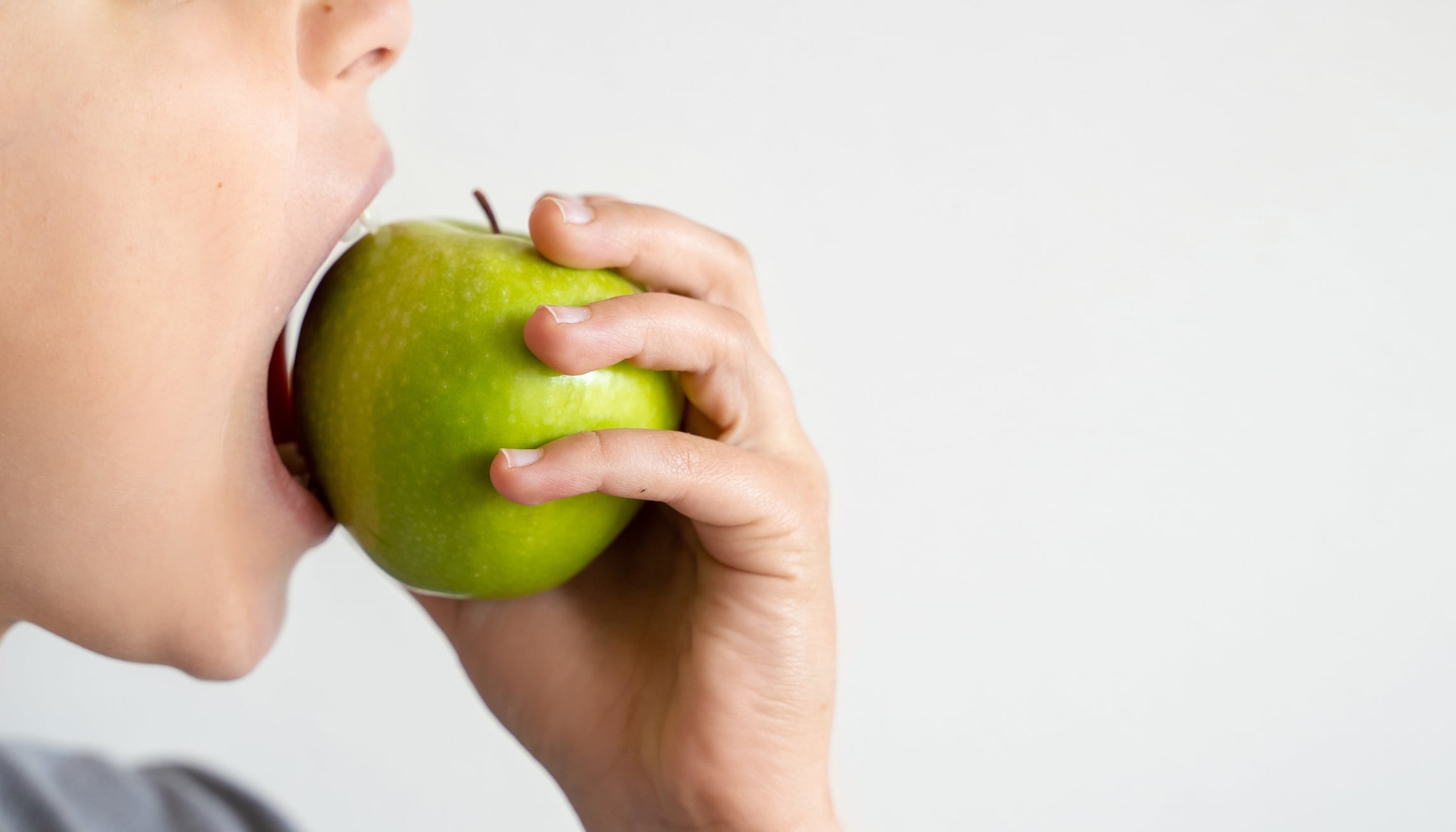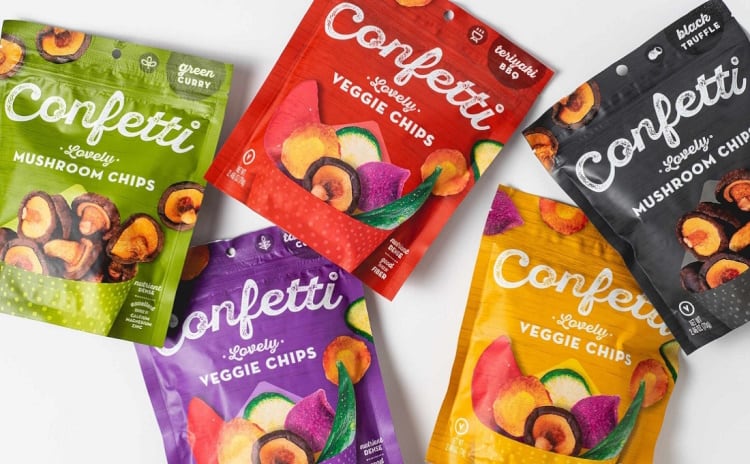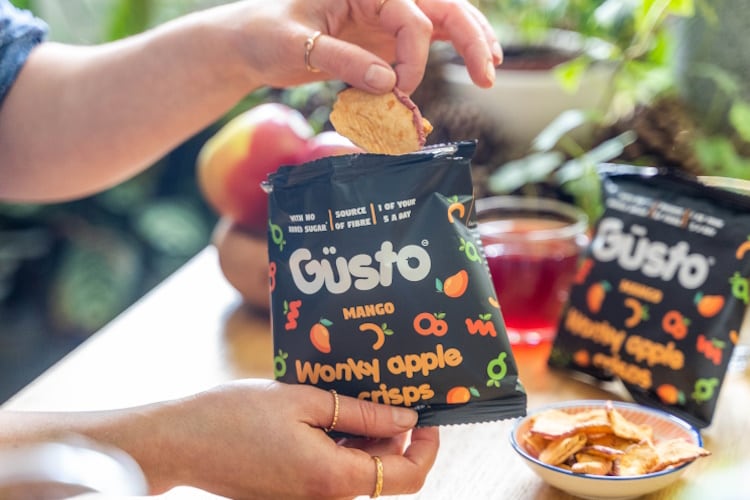The conflict between Gusto Snacks and Holland & Barrett (H&B) is emblematic of the challenges that disruptive startups often face when engaging with established corporate giants. At its core, the dispute revolves around Gusto’s allegations the natural retailer replicated their signature ‘wonky apple snacks’ without proper acknowledgment. However, it’s more than just a case of alleged product imitation; raising questions about business ethics, intellectual property (IP) in the food industry and the balance of power between small producers and resource-rich retailers.
Officially launching in 2021 into a market still reeling from the pandemic, Gusto creates a range of air-dried fruit crisps from some of the almost 3.1m tons of produce that is discarded at farm level in the UK every year for aesthetic reasons, despite being perfectly edible. In fact, for every Gusto snack sold, the London-based producer claims that approximately 30g of apples are saved from the landfill.
A promising opportunity turns rotten
Gusto’s journey toward broader market recognition began during the summer of 2022 at the Bread & Jam festival in Islington. At the event, cofounders Giuseppe Baidoo and Claudio Owusu were approached by a representative from Holland & Barrett, who expressed interest in Gusto’s unique apple crisps, sparking hopes of a mutually beneficial collaboration.
Initially, the meeting at Bread & Jam painted a picture of possibility. The representative’s inquiries into production processes and the potential for private labelling suggested that H&B was keen to explore a partnership that might bring Gusto’s concept to a wider audience.
“We were expecting to meet the snack buyer, but when we were met by the product developer, we were a bit confused,” said Baidoo, “She asked if we were interested in private labelling and who our manufacturer is. We rejected the idea of white labelling as we want to grow our own brand. Our expectation was to launch with [H&B] first and once we built a relationship, we might consider offering private labelling in the long term. We also didn’t disclose our manufacturer, as we thought it was confidential. However, she promised to share our snacks with the right person, which gave us hope.”
Confusingly – even after the buyer in question confirmed they had never received the samples and a second batch was hand-delivered to the retailer’s Nuneaton headquarters - the anticipated response never materialised. Instead, by early 2023, follow-up communications revealed the retailer was planning to launch its own version of apple crisps under a private label, effectively sidelining Gusto’s original creation.
“Why would a company take samples; have meetings with us; seem like they were about to launch our product; and then disappear for a while, only to come back saying they decided to do their own version?” asserts Baidoo.
Holland & Barrett debuted its own Apple Chips 20g (£1.29) in September 2023.
“When I saw their version in stores, I was very disappointed. As a startup, we work so hard to create a good product. Why not give us a chance? We even raised investment because investors believed we were going to secure H&B. So when this didn’t happen, it felt like we lost twice: 1) we weren’t launching with H&B, and 2) we now had competition in the market. I felt beaten.”
Allegations of a copycat
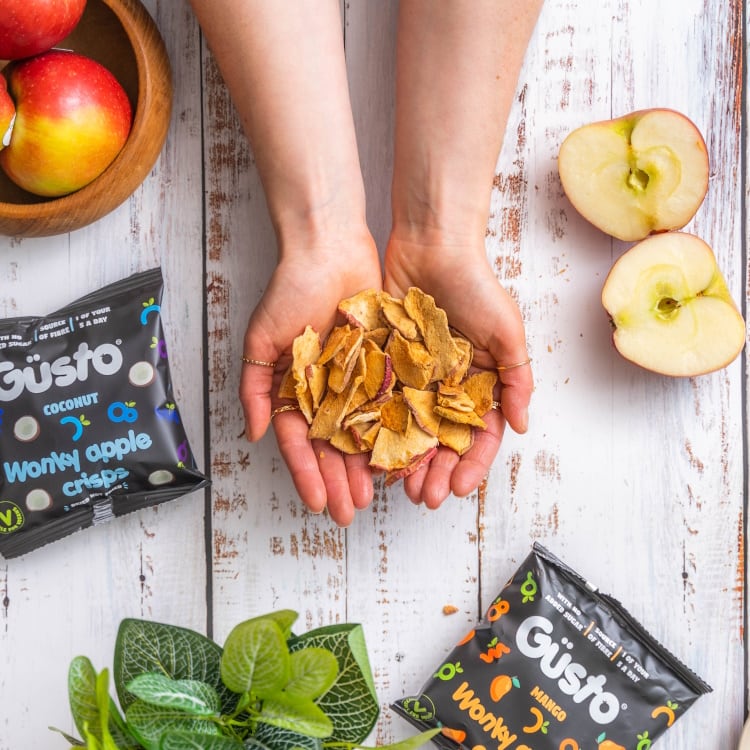
Baidoo’s frustrations grew as details emerged that H&B’s product appeared to mirror some key attributes of Gusto’s apple crisps.
Both products boast the same method - ‘dried not fried’ – and emphasise the use of wonky fruit; a commitment that not only fights food waste but also supports sustainable practices.
For Baidoo, these similarities weren’t merely coincidental. The timeline - from the initial sample deliveries to the abrupt pivot towards an internally developed product - suggests the natural retailer may have taken cues from Gusto’s innovative process while bypassing the small brand entirely.
Instead of retreating quietly into legal corridors, Baidoo decided to reclaim the narrative with an unorthodox, eye-catching stunt. Clad in a playful yet pointed robber costume, he took to the streets outside a Holland & Barrett store, handing out samples of his apple crisps while holding a cheeky sign proclaiming, “Snacks so yummy, they copied in a hurry”. This theatrical gesture was not simply a protest – it was a strategic marketing move designed to directly engage consumers and stir up public conversation about the ethics of corporate appropriation.
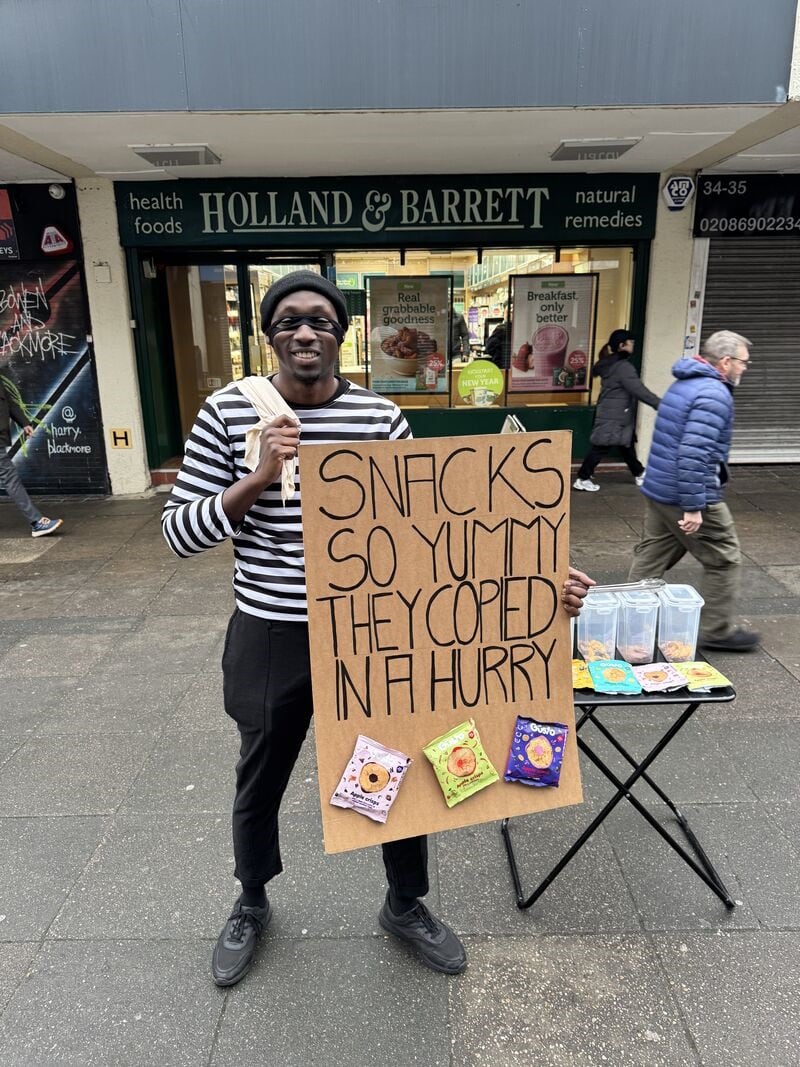
“I wanted to prove to [H&B] that we belong on their shelves and that the original is always the best,” said Baidoo. “I thought perhaps showing them that the crowd wanted our product would encourage them to change their mind, because the customer is always right.”
According to Baidoo, Gusto received 200:2 votes. By inviting shoppers to taste and compare, Gusto effectively shifted the focus from boardroom negotiations to the very real question of which product truly delights the palate.
“Holland & Barrett have gone completely quiet since the campaign. I believe they are doing some damage control,” said Baidoo.
In contrast to the public display by Gusto, H&B’ response has been measured. The company responded to Bakery&Snacks in a statement that the development of its apple crisps had begun in the autumn of 2022 - before any formal dialogue with Gusto took place - and insisted its creation was part of a broader portfolio of fruit-based snacks developed independently.
“Holland & Barrett takes all allegations seriously and is committed to transparency and fairness, but we believe these allegations are without foundation,” it said.
“The planning for our new food range, including fruit and vegetable-based crisps, began in early 2022 with the development of our own brand Apple Crisps beginning in Autumn 2022, well before discussions with Gusto began.
“Our product, made with 100% apple, is one of many types of apple crisps available in the market, and was developed independently as part of a broader food range we launched in September 2023.
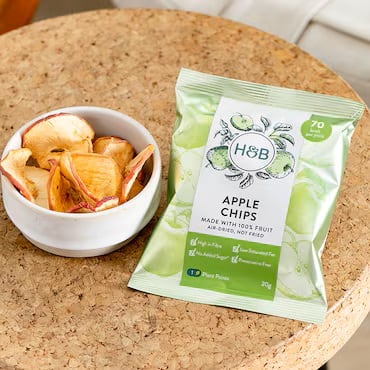
“We regret that Gusto were disappointed we chose not to list their product and did not have a positive experience, and the frustration this may have caused. Our relationships with our suppliers are very important to us and we remain committed to working collaboratively with our partners now and in the future.”
Navigating the grey area of IP in the food industry
One of the most challenging aspects of this saga is the difficulty of protecting food innovations under traditional intellectual property (IP) laws.
Unlike technology or creative works, culinary techniques such as Gusto’s air-drying method and the creative use of cosmetically imperfect fruit often reside in a legal grey area. In many cases, these methods are considered common practice or are simply too difficult to patent, leaving small startups exposed when larger companies decide to replicate market-worthy ideas.
This vulnerability underscores the importance of establishing legal safeguards – such as non-disclosure agreements (NDAs) and detailed documentation of every interaction – before sharing proprietary processes. These steps, though not foolproof, are critical in building a case should disputes arise and in fostering a more secure environment for innovation.
“I think I would have signed an NDA if I could go back,” said Baidoo, who did keep documentation of his negotiations. “It’s very difficult to protect food products, but some form of agreement could have helped. My advice to new startups is not to be afraid to approach big retailers but be cautious when making connections.
“Several individuals have reached out to me regarding similar experiences with other retailers or other supermarkets. Unfortunately, this is something that happens quite often. They were happy to see the marketing campaign I did. Although it was fun, it highlighted an issue in the food system that is not fair on brand owners.”
The power of public opinion
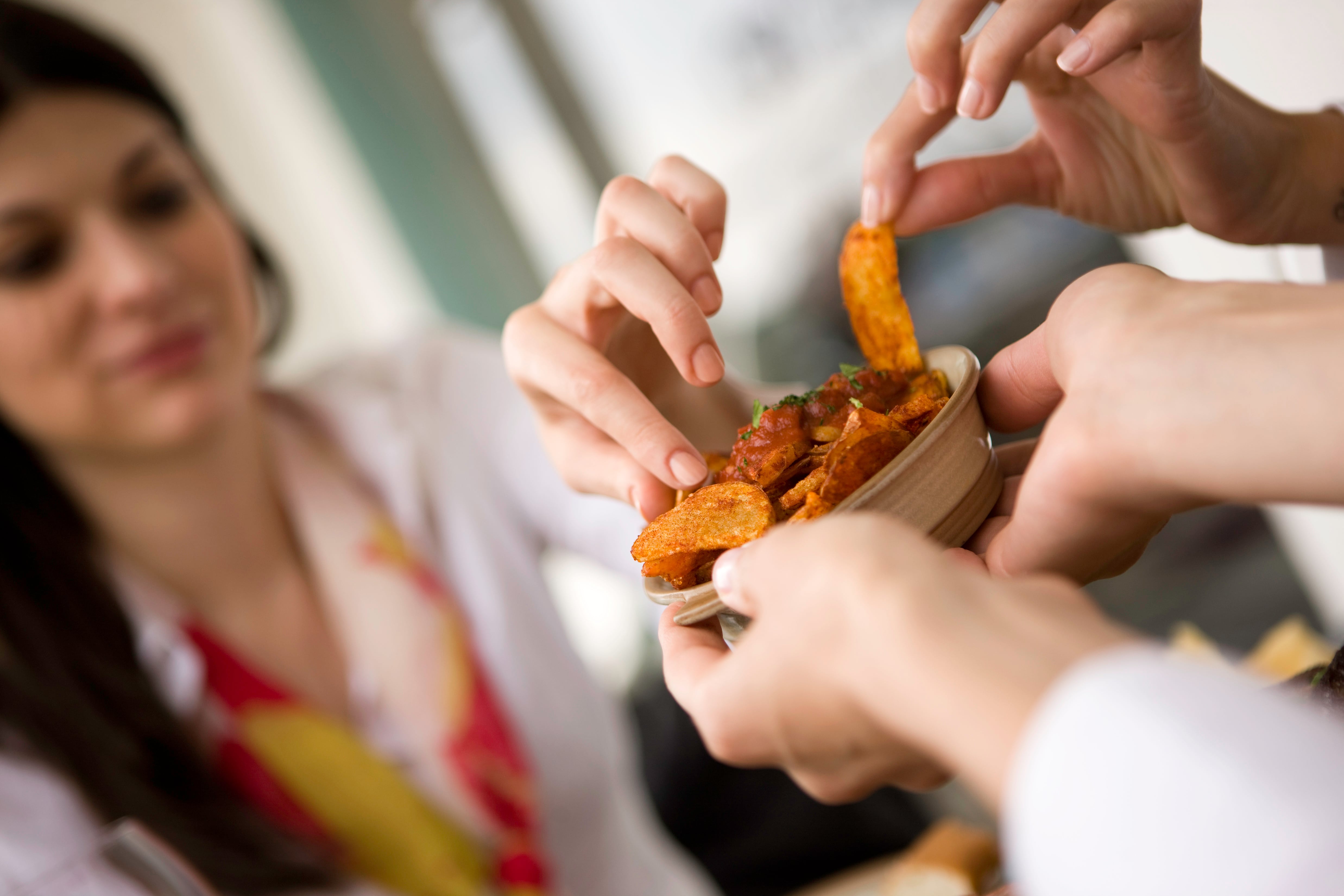
Beyond legal technicalities, the situation raises broader questions about fairness and corporate ethics in an industry where creativity often blossoms in small kitchens before reaching mass markets.
Gusto built its reputation on sustainability and authenticity, values that resonate with today’s consumers increasingly concerned with food waste and environmental responsibility.
Baidoo’s public protest – part performance art, part consumer engagement – strikes at the heart of this issue, inviting the public to weigh in on what is often seen as a David versus Goliath scenario in the food industry.
Public opinion, amplified by social media, has become a powerful force in shaping brand narratives. By turning his protest into a participatory event, Baidoo not only challenged the legitimacy of the retailer’s claims but also highlighted the importance of consumer choice in determining quality. Today, where authenticity and transparency are prized, the final arbiter of success isn’t boardroom strategy but the collective voice of the public.
What lessons can we learn?
The unfolding events between Gusto Snacks and Holland & Barrett offer a valuable lesson.
While centred on apple crisps and wonky fruit, it touches on larger challenges in the food industry. The struggle to balance innovation with ethical practices is a recurring theme in a marketplace where sustainability and health-conscious choices are becoming increasingly significant. There’s nothing stopping a company like Holland & Barrett to introduce products that echo market trends, which coincidentally mirror the innovations of a small startup. But it does highlight the challenges of protecting new ideas in an environment where competition is growing ever fiercer.
Moreover, it serves as a microcosm of the broader tension between corporate power and grassroots creativity. As consumers become more selective about where they spend their money, the demand for products that are both innovative and ethically produced will only grow stronger. By embracing a bold, public-facing response, Baidoo reminded us that consumer opinion can be as decisive as any legal framework.
It’s a cautionary tale for both innovators and established companies: underscoring the necessity of legal safeguards and the power of creative marketing; but also as a call to nurture the innovative ideas that drive the market forward.
Ultimately, the story of Gusto’s wonky apple crisps is a testament to the enduring power of authenticity and sustainability in a world where even imperfect fruit can yield perfectly crisp success.


